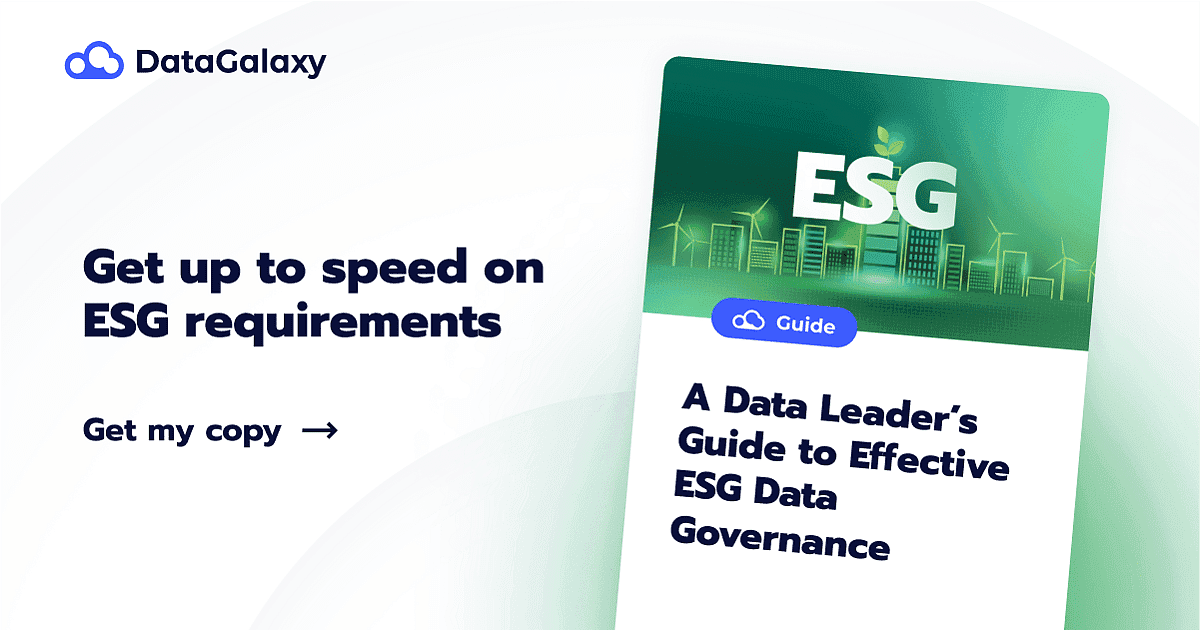Branded Content
Why Your Organization Cannot Afford to Ignore ESG
Written by: Laurent Dresse | Chief Evangelist, DataGalaxy
Updated 1:13 PM UTC, Wed January 24, 2024

Laurent Dresse
Environmental, Social, and Governance (ESG) initiatives represent a fundamental shift in business ethos worldwide. Driven by consumers, investors, and other stakeholders, governments are now addressing the impact of business operations on the environment and society by crafting uniform standards and reporting requirements. Consequently, ESG has become a formidable compliance requirement and a critical element in companies’ strategic decision-making.
The impact of ESG compliance is naturally relevant to Chief Data Officers (CDOs) and Chief Sustainability Officers (CSOs). In addition to leading data governance and compliance efforts, these leaders are often tasked with integrating ESG principles into their organizations’ core activities as well. As such, their roles are becoming a driving force for sustainable and responsible business practices.
As ESG initiatives reshape the corporate world, understanding the value proposition of ESG reporting becomes more crucial.
The Value Proposition of ESG Reporting
ESG reporting holds an influential role beyond compliance in forward-thinking organizations. Treating ESG as a strategic asset can produce the following benefits:
-
Enhanced Financial Performance: Companies committed to ESG principles often experience improved profitability. ESG practices enhance operational efficiency and resource utilization, thereby reducing costs and boosting profitability.
-
Cultivation of Stakeholder Trust: Customers and investors will likely engage with organizations committed to ethical practices and sustainability. Transparency in operations and values builds consumer trust and raises a company’s reputation.
-
Talent Attraction and Retention: Increasingly, professionals seek employment with companies whose values align with their own, particularly in environmental stewardship and social responsibility. By prioritizing ESG, companies can attract top talent motivated just as much by salary as by their work and their company’s impact on the world.
-
Customer Loyalty: Consumers are increasingly mindful of the environmental and social footprint of the products and services they buy. Companies demonstrating a genuine commitment to ESG principles can build a fiercely loyal, like-minded customer base.
The value of ESG reporting extends far beyond compliance. It’s instrumental in driving financial performance, building stakeholder trust, attracting and retaining talent, and fostering customer loyalty. These collective benefits strengthen an organization’s market position, making ESG reporting a tool for competitive advantage in the market.
4 Pitfalls of Inadequate ESG Reporting
Inaccurate or incomplete ESG reporting poses substantial risks for organizations in terms of regulatory compliance and stakeholder trust. Failing to deliver accurate reporting undermines everything from regulatory compliance to reputation and investor confidence. Failure to meet stringent standards holds tremendous downsides.
-
Regulatory penalties: One of the most immediate risks is the potential for regulatory penalties. As global awareness and an emphasis on sustainable practices rise, regulatory bodies have intensified scrutiny and enforcement of ESG disclosures. Non-compliance with these standards can result in significant fines and other legal repercussions, threatening a company’s financial health and viability.
-
Reputational damage: Beyond legal implications, reputational damage due to poor or misleading ESG reporting can be even more detrimental. In our digitally interconnected world, information spreads rapidly. Any perceived negligence or misrepresentation in ESG reporting can quickly erode public trust. A decline in consumer confidence can have a lasting impact on brand perception and customer loyalty. It can lead to eroding competitiveness and long-term loss of market share.
-
Investor distrust: Investors are increasingly factoring ESG criteria into investment decisions, viewing them as indicators of sound management and long-term sustainability. Inaccurate or insufficient reporting breeds skepticism, which is anathema to additional investment. Adverse shifts in investor confidence can significantly impact a company’s access to capital and financial stability.
-
Can impair operational efficiency: Inadequate ESG reporting can also impair operational efficiency and hinder legal compliance. Without complete and accurate ESG data, organizations will struggle to identify and address environmental and social risks. These gaps can easily result in higher operational costs and inefficiencies. Moreover, lacking in-depth ESG insights can hinder an organization’s compliance with legal standards, exposing it to regulatory risks.
Clearly, ESG reporting enhances business value. Yet, it is equally vital to understand the risks associated with inadequate ESG practices.
Global Context: The Critical Importance of ESG Reporting
The global ESG movement can trace its origins to a consumer-led shift toward cause-driven purchasing behaviors. Growing awareness and preference for products and services from companies prioritizing environmental and social causes had taken firm root in consumer behavior.
In response to this burgeoning movement in consumer sentiment, companies began to make public statements and develop and implement their own ESG reporting, focusing on their sustainable practices and business models.
However, this self-reporting led to disparate and, at times, less-than-honest standards and disclosures, which cast a shadow over their practices. This inconsistency highlighted the need for more standardized regulation.
This consumer-driven change has had a cascading effect, influencing corporate policies worldwide and prompting regulatory bodies to respond. Recognizing this trend, global organizations and governments, including the United States and the European Union, have instituted national and international ESG frameworks and standards.
These regulatory measures, such as the European Green Deal, the Sustainable Finance Disclosure Regulation (SFDR), and the Corporate Sustainability Reporting Directive (CSRD) in the EU, along with initiatives by the Securities and Exchange Commission (SEC) in the US, have provided a formal structure and bolstered the ESG movement.
The progression from consumer preferences to corporate action and regulatory support exemplifies a holistic response to the growing demand for sustainable and socially responsible business practices. It underscores a dynamic interaction between market forces and regulatory frameworks, where both are evolving in tandem to support and reinforce each other. Each aims for a more sustainable and ethically responsible global market.
In light of the importance of ESG regulatory compliance, businesses are diligently reviewing their products and processes to meet these standards. Data catalogs have become instrumental in this quest.
The Pivotal Role of Data Catalogs in ESG Reporting
Given the pivotal role of managing, organizing, and analyzing complex data in ESG reporting, data catalogs like DataGalaxy have become essential tools. For instance, DataGalaxy’s Data Knowledge Catalog masters the intricate and voluminous data associated with ESG reporting. It manages key areas critical to effective ESG compliance and strategic decision-making, including:
-
Centralized Data Integration: DataGalaxy provides a comprehensive platform for integrating ESG data points from multiple sources. This centralization is essential for companies consolidating diverse ESG metrics, such as carbon emissions, workforce diversity, and supply chain practices.
-
Maintaining Data Integrity: The platform ensures data integrity, a cornerstone for credible ESG reporting, through several key features:
-
Clean Data: DataGalaxy implements data points validation workflows and standardization protocols to maintain the accuracy and integrity of data.
-
Secure Data: The platform provides robust security features, including access policies and authorization, to protect sensitive ESG information.
-
Traceable Data: DataGalaxy offers data lineage tracking, enabling organizations to trace the history and transformation of their ESG data, which is crucial for transparency and accountability and can be used as evidence towards regulation authorities
-
Data catalogs like DataGalaxy streamline ESG data collection, compliance, and decision-making. Here’s how:
-
Streamlined Data Collection: DataGalaxy streamlines ESG data collection by automating the aggregation process, reducing manual efforts, and minimizing errors. This efficiency is vital in gathering complex data sets required for comprehensive ESG reporting.
-
Adaptability to Compliance Needs: As ESG regulations evolve, DataGalaxy’s adaptable platform ensures that organizations remain compliant with these changing standards. This is critical for maintaining adherence to global standards and local regulations.
-
Facilitating Informed Decision-Making: The platform’s analytical tools empower companies to derive actionable insights from their ESG data, which are invaluable for resource allocation, sustainability planning, and strategic decision-making.
Incorporating DataGalaxy’s Data Knowledge Catalog into ESG reporting processes ensures compliance and empowers organizations to effectively use their ESG data as a strategic asset. Integrating advanced data management solutions is pivotal in driving business growth and sustainability.
The Imperative for Action
Meeting ESG compliance is crucial for promoting financial stability, maintaining a strong reputation, and securing investor trust. The cornerstone of effective ESG reporting lies in comprehensive data management solutions that ensure data accuracy, security, and traceability.
Platforms like DataGalaxy, a leading figure in the data catalog arena, are vital for streamlining ESG and other governance and compliance endeavors. They offer a resilient framework for organizing and securing ESG data, equipping organizations with the tools to meet reporting obligations confidently.
The strategic integration of advanced data management solutions in ESG reporting is a regulatory necessity and a key driver for business growth and sustainability. As guardians of data integrity and ESG compliance, Chief Data Officers and Chief Sustainability Officers are uniquely positioned to guide their organizations toward a future where sustainability and business success go hand in hand.
In this dynamic scenario, CDOs and CSOs must take charge of ESG compliance efforts. Their role is pivotal in harnessing the capabilities of tools like DataGalaxy’s data catalog, not just for compliance but to seize opportunities for competitive advantage.
By effectively leveraging these platforms, CDOs and CSOs can ensure their organizations comply with ESG mandates and stand out in the marketplace for their commitment to sustainability and ethical practices.

About the Author:
Laurent Dresse, Chief Evangelist at DataGalaxy, brings his expert industry knowledge, experience, and determined energy to the table to help solve your company’s challenges.
Holding a graduate degree in SME Management, Dresse began his career at Stefanini as a Solution Engineer. After six years, he became the Manager of European IT Support at Coca-Cola Enterprises, where he was a key player in establishing state-of-the-art support in manufacturing and office operations.
Today, Dresse is Datagalaxy’s top evangelist and thought leader, using his market expertise and observations to educate the public on key data governance topics.
With over twenty years of experience, Laurent has successfully completed 100+ international projects with Ansell, Cognizant, BearingPoint, and of course, DataGalaxy. Dresse will work effectively with your teams, listen to their ideas and concerns, and implement the necessary changes to make their Data Catalog initiative a great success!


